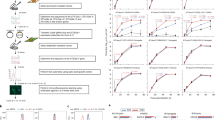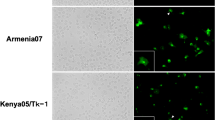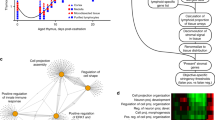Abstract
CERTAIN influenza A viruses multiply readily in bovine kidney cells1. Calf kidney cells infected with the influenza A strain WS produce virus continuously for about 2 days and then cease to do so. Few cells degenerate. After a few more days influenza virus begins to appear again (Fig. 1). Periods in which the amount of virus formed rises and falls may alternate in this way for up to three months. Cultures, infected 6–12 days previously, which were yielding no detectable influenza virus hæmagglutinins, were found to be resistant to superinfection with Sendai virus. No hæmagglutinin was produced and no degeneration occurred.
This is a preview of subscription content, access via your institution
Access options
Subscribe to this journal
Receive 51 print issues and online access
$199.00 per year
only $3.90 per issue
Buy this article
- Purchase on Springer Link
- Instant access to full article PDF
Prices may be subject to local taxes which are calculated during checkout
Similar content being viewed by others
References
Heath, R. B., and Tyrrell, D. A. J., Arch.ges. Virusforsch, 8, 577 (1958).
Isaacs, A., and Lindenmann, J., Proc. Roy. Soc., B., 147, 258 (1957).
Burke, D. C., and Isaacs, A., Brit. J. Exp. Path., 39, 452 (1958).
Author information
Authors and Affiliations
Rights and permissions
About this article
Cite this article
TYRRELL, D. Interferon produced by Cultures of Calf Kidney Cells. Nature 184, 452–453 (1959). https://doi.org/10.1038/184452a0
Issue Date:
DOI: https://doi.org/10.1038/184452a0
This article is cited by
-
Production, purification and characterization of rat interferon
Archives of Virology (1979)
-
Examination of “Species Specificity” of Avian Interferons
Nature (1970)
-
Establishment, steady state and cure of a chronic infection of LLC cells with West Nile Virus
Archiv f�r die gesamte Virusforschung (1968)
-
Genommaskierung beim Maul- und Klauenseuche-Virus und das Verhalten von genommaskiertem Virus bei der Thermoinaktivierung
Archiv f�r die gesamte Virusforschung (1967)
Comments
By submitting a comment you agree to abide by our Terms and Community Guidelines. If you find something abusive or that does not comply with our terms or guidelines please flag it as inappropriate.



